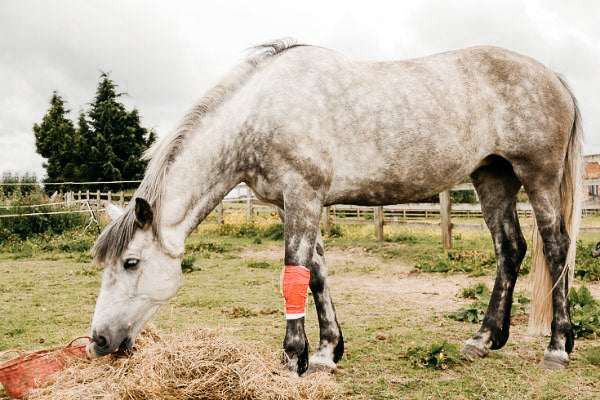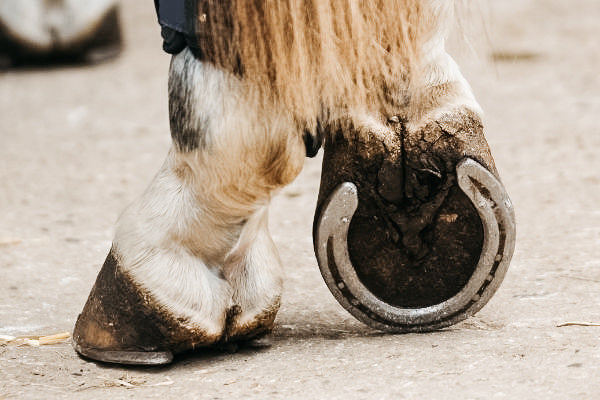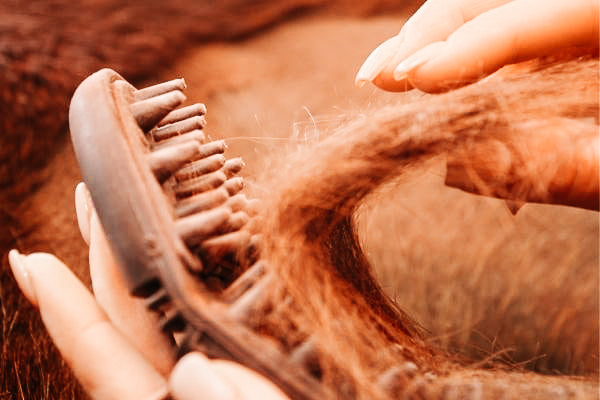
First aid for horses
Many professions and further training require a first aid course as an entry requirement.
But what if our beloved four-legged friend needs first aid? Get our horse into the stable side position? Perform mouth-to-nose ventilation? Hardly likely.
And yet there are first aid measures for horses that every horse lover should know and can easily carry out.

Colic in horses is the most common cause of death, and this is where first aid measures and the right colic horse home remedies pharmacy can save lives. The clinical picture is not really uniform, but if your horse shows discomfort and restlessness, you should take it seriously.
Signs of colic in horses include frequent looking around at the stomach and a horse that constantly tries to roll over.
Your horse may sweat, breathe quickly or appear lethargic. If your horse has colic, be sure to call the vet. While you wait for him, you can give the horse first aid by carefully walking him. This has an antispasmodic effect and at best reduces your horse's stomach pain. If your horse apples, that's a good sign.
If your horse sweats, a sweat blanket will protect you from getting cold. Under no circumstances should your horse eat or drink now. The horse pharmacy should also consist of small rations of schnapps. In the case of mild colic, this home remedy can cause the symptoms to subside quickly. Other colic horse home remedies include plants that stimulate intestinal activity such as anise, fennel or caraway or mucus-forming plants such as linseed, marshmallow or mallow.

Another very dangerous disease is pharyngeal obstruction. This causes food to get stuck in the esophagus, which can result in fatal pneumonia. If the horse is restless, sweating and lowering his neck in an attempt to choke, this often indicates such a blockage. Horse Throat Congestion First Aid is characterized by trying to massage the food toward the stomach while you wait for the vet. Have a clean bucket and a hose ready; the vet will need this if first aid for your horse's throat blockage hasn't been enough.
If your horse has sustained an injury, just like with people, a pressure bandage for wound care can be used as first aid for the horse. When it comes to horse's legs, wound care is still relatively easy, but it becomes more difficult if your horse has injured its shoulder. The horse's first aid kit should definitely contain a compression bandage that you can place unrolled on the wound. A padding wadding covers the wounded area and a gauze bandage fixes the bandage. An elastic, self-adhesive fixation bandage completes the horse's emergency kit and prevents the bandage from slipping.

Slight nosebleeds in horses are relatively common and are no reason to panic. As first aid for horses, you should immobilize your horse. After a short time the bleeding should stop. If it doesn't, or if your horse is bleeding heavily from its nostrils, you should definitely call the vet. Here, too, provide first aid to the horse and calm your horse so that the excitement does not increase the bleeding.
You see, the first aid measures are very complex and vary depending on the clinical picture. It is important to always react calmly and calmly so that your horse does not panic. Horses perceive their humans' feelings immediately and unfiltered, and you can use your calmness to signal to your four-legged friend that they will soon be helped.
Continue to always keep your horse pharmacy up to date. In addition to the utensils for wound care, you shouldn't forget the home remedy schnapps. And if it's not colic in the horse, but another emergency, the schnapps can at least calm you down until the vet comes.
Well then, cheers!
Discover more posts

It is one of the most common horse diseases of the hoof - thrush. But what exactly is behind it? What is thrush in horses? Thrush in horses is a bacterial hoof disease. In thrush, ...
Continue reading
Sub-zero temperatures in winter, bikini weather in summer: the seasons determine whether we dress airy or combine several layers in an onion look. Our partner horse is also prepared for the ch...
Continue reading
